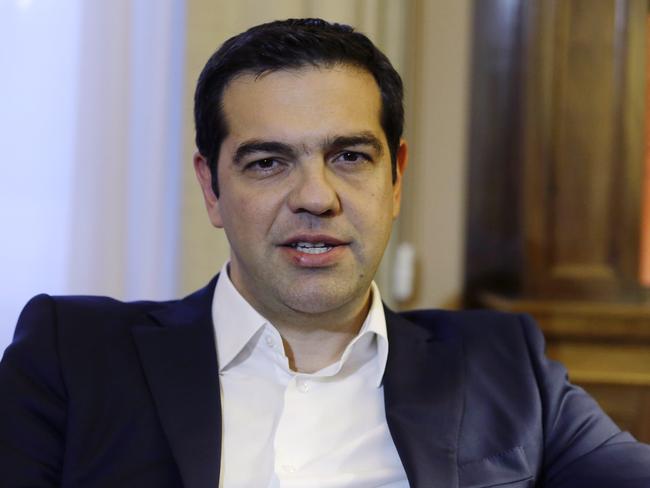Greece has submitted proposals for economic reform to its European creditors in final effort to save itself
GREECE’s left-wing PM will spend today pleading with colleagues to back his harsh new austerity package, but many feel humiliated by the backflip.

GREECE’s left-wing Prime Minister Alexis Tsipras will today plead for his colleagues to back a harsh new austerity package to avoid a catastophic exit from the eurozone.
However this crucial meeting comes less than a week after the same man was passionately urging his citizens to reject milder cuts in a referendum.
Late on Thursday (Wednesday morning AEST), Greece’s government ministers signed off on the sweeping new measures — likely to extend the recession after six years of painful decline — in a last-ditch effort to save their economy from collapse.
The detailed, cost-accounted document for economic reform was submitted in a mad rush less then two hours before the midnight deadline (9am AEST) imposed by European creditors.
The government has agreed to longstanding demands by creditors to impose sweeping tax hikes and pension cuts — measures they had previously resisted and that Greeks voted against in a referendum last weekend.

And in exchange, the government is asking for debt relief and a new three-year 53.5 billion euro rescue loan.
“The Greek proposal... includes funding of the country’s financing needs... for three years, debt adjustment and a front-loaded investment package of 35 billion euros,” a government source said.
The proposals were sent to rescue creditors for approval at emergency meetings of European Union leaders and finance ministers over the weekend, with a make-or-break summit scheduled for Sunday.
But Tsipras must first get authorisation from parliament in a vote Friday, asking his Syriza party to sign off on the U-turn despite more than 60 per cent of voters opposing more austerity in the July 5 referendum.
A prominent dissenter, Energy Minister Panagiotis Lafazanis, urged the government not to sign a third bailout.
“The choices we have are tough ... but the worst, the most humiliating and unbearable choice is an agreement that will surrender, loot and subjugate our people and this country,” he told a business conference.

Greece had voted ‘no’ in last weekend’s referendum, he said, “and that will not be turned into a humiliating ‘yes.”’
Protesters who had backed a “yes” vote returned to the streets Thursday, with several thousand gathering outside parliament.
More rallies, backing and opposing the government, are planned in central Athens on Friday.
Measures put forward by the Greeks
Greece’s 13-page document laying out its reform proposals echo those put forward by Greece’s creditors on June 26, which Athens had initially rejected. Here are the main points.
SALES TAX REFORM Greece has proposed reforming its Value Added Tax (VAT) regime - a key bone of contention in the talks - in the hope of raising revenues by 1.0 percent of GDP. The new regime would unify rates at a standard 23 per cent, including for restaurants and caterers which currently enjoy 13 per cent. Basics such as food, energy and water will remain at 13 per cent, while the rate will be fixed at six percent for medical supplies, books and theatre.
ABOLISH ISLAND TAX BREAKS The government has proposed reducing financial advantages offered to Greece’s islands, including abolishing a 30 per cent VAT break in place for several years. This would start on the wealthiest islands in October and those most popular with tourists, and be completed by the end of 2016.
RAISE OTHER TAXES Corporate tax would be raised from 26 per cent currently to 28 percent — meeting the demands of Greece’s creditors but below the 29 per cent initially put forward by Athens.
Taxes on luxury items would also be raised and a tax on television adverts would be introduced.

PENSION REFORM The age of retirement would be fixed at 67, or 62 for people who have made 40 years of contributions by 2022. Athens said it would also “create strong disincentives to early retirement” including adjusting early retirement penalties.
CUTS TO MILITARY SPENDING Athens is offering to cut 100 million euros from its military budget this year and 200 million euros in 2016 by reducing headcount and procurement. Creditors had asked for a 400-million-euro reduction.
TAX DODGING The Greek government has put forward measures to clamp down on tax evasion, a huge problem in Greece, and to streamline its tax collection systems.
ADMINISTRATIVE REFORM Consultants will be brought in to assess civil servants and a series of measures are planned to modernise the public sector.
PRIVATISATION The Greek government plans to sell the state’s remaining shares in Greek telecoms giant OTE and commit to privatising the ports of Piraeus and Thessaloniki no later than October.
BUDGET TARGETS Athens had initially agreed with its creditors’ demands to cut its primary surplus to one per cent of GDP this year, followed by 2 per cent in 2016 and 3 per cent in 2017.
But on Thursday Greece indicated these targets would need to be re-examined in light of the dire economic conditions gripping the country, including the impact of capital controls and the shutdown of the banking system.
PUBLIC DEBT Greece has also promised to rein in its public debt, currently 180 per cent of GDP, according to a government source who gave no further details on the thorny topic.
HELPING RECOVERY A package of 35 billion euros to help boost Greece’s economic growth has already been put on the table by the European Commission, according to a Greek government source.
The next steps
A spokesman for Eurogroup president Jeroen Dijsselbloem tweeted that the documents were received and that it was “important for institutions to consider these in their assessment” of the Greek situation.
The new reform proposals will now be scrutinised by officials from Greece’s EU-IMF creditors.
They will then go before eurozone finance ministers on Saturday and a full summit of all 28 European Union leaders on Sunday, which is being billed as the key deciding moment for Greece’s financial future.
But some key creditors remain sceptical of Greece’s commitment to reforms.
There is also growing pressure for the eurozone to ease Greece’s crushing 320 billion euro (AU$474 billion) debt burden.
The notion is gaining ground, despite reluctance from Germany.

Donald Tusk, who chairs the EU summits, indicated that European officials would make an effort to address Greece’s key request for debt relief.
“The realistic proposal from Greece will have to be matched by an equally realistic proposal on debt sustainability from the creditors. Only then will we have a win-win situation,” Mr Tusk said.
On Thursday, German Finance Minister Wolfgang Schaeuble said the possibility of some kind of debt relief would be discussed over coming days, though he warned it may not provide much help.
“The room for maneuver through debt reprofiling or restructuring is very small,” he said.
European authorities have remained cautious
After a jocular start to a summit on Tuesday which attracted the ire of EU leaders, Tsipras yesterday took a more sombre tone as he announced new reform measures could begin as early as next week.

Tsipras assured the government’s plans would provide a “definitive end” to his country’s financial woes.
“We need to ensure the medium-term funding of our country with a development and growth program,” Tsipras told EU lawmakers in Strasbourg.
His words were greeted with positivity but caution.
Spain’s Prime Minister Mariano Rajoy said: “The tune has changed, it’s not what we were hearing until now and that’s positive.”
Many others however feared the “new” package would include the old already rejected features such as a request for the EU to wipe off 30 per cent of the debt as a goodwill gesture. Such a move would be blocked by Chancellor Angela Merkel with 100 of her own MPs threatening a rebellion is she makes to back down. German opinion polls have also hardened with a whopping 92 per cent of Germans reportedly dead against a third bailout plan.
Greece has already had two bailouts from its European partners and the International Monetary Fund since May 2010, totalling 240 billion euros (AUD$358 billion) with overall debt topping 323 billion euros (AUD$481.4) and defaulted on one payback plan and is due to default on a second toward the end of this month.

A Grexit may still be possible
Despite his pledge many analysts predict the nation will move to a Grexit by week’s end. A Reuters poll of EU economists has shown for the first time 55 per cent believe a Grexit will happen.
Both France and the White House in the US warned of a geopolitical consequences if Greece fell, interpreted to involve Russia which has already moved to strengthen an alliance with Greece.
Meanwhile Greek State television has reported that all banks in Greece would continue to remain closed until at least Monday and that all capital controls, including sending money offshore and withdrawing more than 60 euros a day, would continue. Banks were to have been opened today. The controls were issued more than a week as an interim measure. Latest predictions based on the levels of constant 60 euro ATM withdrawals by the entire population is that cash reserves will run out by Friday.



